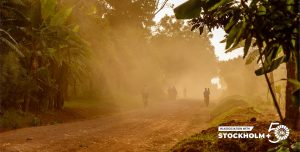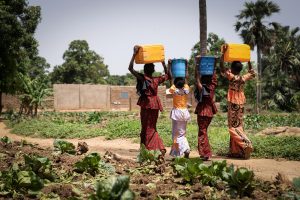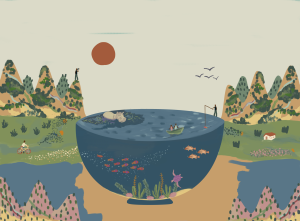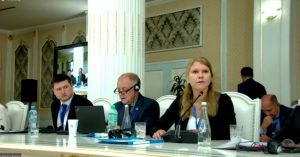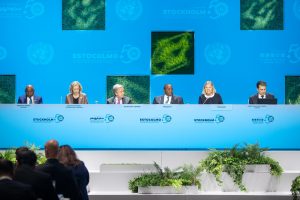World Water Week At Home is now live – join us!
World Water Week At Home opened on Monday 24 August with 120 unique sessions. During the coming week, water and development experts from across the world will share their best ideas for tackling global issues, especially climate change.
World Water Week At Home opened on Monday 24 August with 120 unique sessions. During the coming week, water and development experts from across the world will share their best ideas for tackling global issues, especially climate change. “We are starting to see a breakthrough for water solutions,” said SIWI’s Executive Director Torgny Holmgren during the Opening ceremony.
World Water Week At Home is held 24-28 August, with 120 sessions that anyone can join. During the Opening on Monday, SIWI’s Executive Director Torgny Holmgren and Gabriela Suhoschi, Director World Water Week & Prizes stressed the importance of the event.
“At the climate conference COP25 in Madrid last year, we started to see a welcome breakthrough where more countries began to search for water solutions, not least in their nationally determined contributions to the Paris agreement. Now we hope that this thinking will gain more traction ahead of COP26 next year,” Torgny Holmgren said.
He specifically pointed to three trends that are prominent in many of the World Water Week At Home sessions, where water-related climate solutions was one of them. Another major trend is a new focus resilience when countries now struggle to restart their economies and societies after the Covid-19 pandemic. This is a perfect time for countries to invest more in water infrastructure and to ensure access to wate rand sanitation for all, Holmgren said.
The third trend running as a common thread through much of the programme is behavioural change. Torgny Holmgren called on the water, climate and development communities to work more actively to people to both change their own behaviour and build more sustainable societies.
Strengthened resilience
This can for example mean that more countries restore landscapes such as wetlands and forests that hold carbon; that more cities use nature-based solutions to cope with flooding; and that oceans are protected by stemming the flow of pollution from land.
Examples of how this can be done in practice were presented during the Meet the ministers session when SIWI’s Kanika Thakar and Maggie White talked to government representatives from Colombia, the Netherlands, Senegal, South Africa and Sweden about how they have tackled Covid-19 in a way that also boosts their resilience to climate change and water issues.
Serigne Mbaye Thiam, Minister of Water and Sanitation from Senegal, spoke on behalf of the country’s President, Macky Sall, and said: “The building of resilient societies of today and tomorrow must be based on a paradigm shift and a holistic approach to water issues in order to provide tangible answers to the challenges of universal access to water and water.”
Similar sentiments were expressed by his Swedish colleague, Isabella Lövin, Minister for Environment and Climate: “Water is a necessity of life and an engine for development. Through its response to the Covid-19 pandemic, the world has proved that it has the capacity to change rapidly. We should use this momentum to transform our way of living into what is in line with reaching the sustainable development goals. Sustainable water management is an integral part of that,” she said.
Sanitation for all
Jose Luis Acero, Vice minister of Water and Basic Sanitation in Colombia, described 25 concrete actions taken by his government after Covid-19, with a focus on ensuring that vulnerable groups have access to clean water and strengthening water infrastructure. Colombia has also made significant advances when it comes to protecting its ecosystems, including recognizing the rights of nature and indigenous peoples.
Cora van Nieuwenhuizen, Minister of Infrastructure and Water Management for the Government of the Netherlands, called on all countries to make significant investments in their water infrastructure in the face of a warming climate. “Water must be at the heart of recovery efforts after the current pandemic, she said.
Lindiwe Nonceba Sisulu, Minister of Human Settlements, Water and Sanitation, South Africa, described how her country still is impacted by the heritage from the apartheid era. The recent pandemic has made it clear that much work remains to be done, but Lindiwe Nonceba Sisulu has a clear goal: “I will not rest, while in this portfolio, until I see every South African rich or poor, urban or rural, having Access to Clean Water,” she said.
Diverse perspectives
The session ended with the popular British singer-song writer Låpsley performing her new song ‘Through Water’ which she wrote to raise awareness of how climate change will impact water.
Gabriela Suhoschi, Director World Water Week & Prizes, describes how proud she is of the passion and enthusiasm demonstrated by the many organizations hosting events in the coming week: “We are very happy that to be able to offer such a diversity, with distinguished speakers helping us understand important new trends. In today’s turbulent world there is great need for this type of reflection and analysis, so I hope that many people will seize the opportunity to tap into this knowledge,” she said.
World Water Week At Home has managed to attract a broad range of session organizers, from leading international organizations, academia, the business sector, and governments.
Check out the programme for details about all the 120 sessions, including how to join them!
Don’t miss tomorrow’s exciting award ceremony for the Stockholm Junior Water Prize. At 2 pm CET on Tuesday 25 August, H.R.H Crown Princess Victoria of Sweden will announce the winner of the Stockholm Junior Water Prize. Competitors aged 15 to 20 compete with amazing water projects that solve major real-world problems. Join the session through this link: Stockholm Junior Water Prize.
![WWW@Home_Opening-01[1]](https://dev.siwi.org/wp-content/uploads/2020/08/wwwhome_opening-011-scaled-1.jpg)

